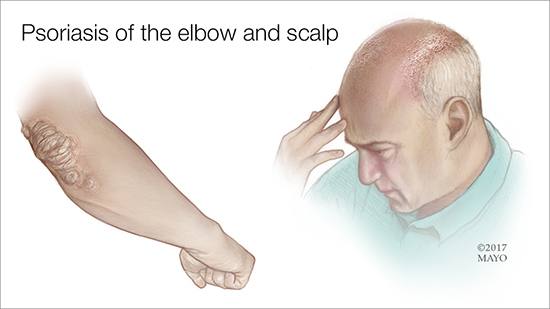-
Featured News
Mayo Clinic Q and A: Treating psoriasis
 DEAR MAYO CLINIC: Is there any way to know what causes psoriasis? What’s the best way to treat it?
DEAR MAYO CLINIC: Is there any way to know what causes psoriasis? What’s the best way to treat it?
ANSWER: Psoriasis has a tendency to run in families, and exacerbations often are linked to the body’s immune system responding to certain internal or external factors. The exact cause of psoriasis is not easy to determine. Treatment depends on how severe the psoriasis is and how responsive it has been to previous treatment. Treatment usually starts with mild approaches and proceeds to stronger remedies but only as they are needed.
Psoriasis is a skin disease that affects the life cycle of skin cells. Normal skin grows and sheds every 28 days, or about once a month. Psoriasis skin regenerates every 72 hours. When the immune system becomes activated and attacks the skin cells, psoriasis causes the cells to build up rapidly on the skin’s surface. Because the body cannot shed skin that quickly, a callous forms on the skin. The result is thick, silvery or white scales, and dry, red skin patches that can be itchy and even painful.
Psoriasis seems to have a genetic component, but it can occur in people who do not have any family members with the disease. Many people who are predisposed to psoriasis may be free of symptoms for years until the disease is triggered by some environmental factor.
One common trigger for psoriasis is stress. That can mean physical stress from illness, fatigue or sleep deprivation, or emotional stress due to a difficult life event, such as the death of a family member or loss of a job. In some cases, a high level of stress may spark a dramatic psoriasis outbreak, with skin appearing normal one day and then developing multiple patches of psoriasis all over the body several days later.
Other factors that can raise the risk of psoriasis outbreaks include being overweight, smoking and exposure to secondhand smoke. These factors not only can trigger psoriasis, but also they can make the disease harder to treat.
A variety of treatment choices are available that may manage symptoms and decrease flare-ups. In mild to moderate cases, treatment usually starts with creams and ointments used alone. In more severe cases, light therapy combined with topical treatment can be useful. Unfortunately, there isn’t a cure for psoriasis.
Psoriasis that is severe or doesn’t respond to other treatments may require oral or injected medications (systemic treatment). These medications can have serious side effects, however. Ideally, they are used only for limited periods of time.
Successfully treating psoriasis can be challenging. What works for one person might not work for another. Treatments may be effective for a while. Then, the body builds up resistance to them, and they no longer work. Psoriasis also can be unpredictable, going through cycles of improvement and worsening, seemingly at random.
Despite these challenges, it is important for you to continue with treatment and find one that works for you. If left untreated, psoriasis can lead to, or intensify, other medical problems, such as arthritis and heart disease.
If you are being treated for psoriasis, but it persists, or if you are having uncomfortable side effects from treatment, talk to your health care provider about other options. He or she can help you develop a treatment plan or change your current treatment approach to best control your symptoms. — Dr. Dawn Davis, Dermatology, Mayo Clinic, Rochester, Minnesota







